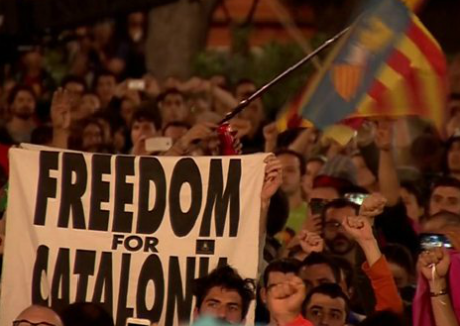Columns
You are here
Self-determination for Catalonia

October 2, 2017
The forces of the Spanish state have begun brutal repression of Catalan citizens attempting to vote in the October 1 referendum on independence. Images of voters being forcibly removed from polling stations at gunpoint, tear-gassed and shoved down stairs are being circulated widely on social media.
The mayor of Barcelona, Ada Colau Ballano responded to the repression in Catalonia with the following statement: "It is unacceptable that the police should be thrown against an unarmed population that has mobilized to exercise its right to vote... Mariano Rajoy [Prime Minister of Spain] is a coward."
Repression and resistance
However, Catalan citizens are fighting back in the streets against this threat to democracy. There was a brilliant image of firefighters forming a line of defence between police thugs and the citizens who are trying to exercise their democratic right to decide their own future.
In this situation the international left and anyone who supports the democratic right of people to decide their own future must be on the side of the Catalan people—whatever decision they make about their future. If the vote is not allowed to take place because of repression on the part of Spain there should be protest rallies around the world.
The Catalan CGT, a trade union grouping of some tens of thousands, released a statement in the lead-up to October 1: “After discussions with other unions, we have submitted the call for a general strike starting on 3 October,” it said.“We do not want labour reforms that enslave our lives, nor the authoritarianism of those who believe that they will destroy our rights.”
There is even more reason now for them to go ahead with these plans.
There were solidarity demonstrations in towns and cities across Catalonia leading up to the vote. But they also took place in Madrid and several other Spanish towns. This is important because it points to the possibility of solidarity from Spanish workers with their brothers and sisters in Catalonia and opposition to the Spanish state, which in recent years has imposed harsh policies of austerity on workers, students and farmers across the board.
The security crackdown could backfire on the government. It can also point to the possibility of a growing movement which can be about more than independence. Quim Arrufat from the anti-capitalist, pro-independence Popular Unity Candidacy (CUP) party was quoted before the October 1 saying, “by voting [on Oct 1] we will say no to Rajoy's regime.” "This is not about culture or identity—it is about people's power. We want to take control from the regime, the banks and the army."
Self-determination
It’s critical to understand the importance of defending the right to self-determination of an oppressed nation. Russian revolutionary Vladimir Lenin argued that socialists who failed to understand this necessity were dooming not only the particular national struggle but also any possibility of moving towards a socialist future:
“The socialist revolution is not one single act, not one single battle on a single front; but a whole epoch of intensified class conflicts, a long series of battles on all fronts, i.e., battles around all the problems of economics and politics, which can culminate only in the expropriation of the bourgeoisie. On the contrary, just as socialism cannot be victorious unless it introduces complete democracy, so the proletariat will be unable to prepare for victory over the bourgeoisie unless it wages a many-sided, consistent and revolutionary struggle for democracy.”
A crucial part of the struggle for socialism in Russia was the understanding that it was necessary to break what Lenin referred to as “the prison house of nations” – greater Russian chauvinism – in order to build a united fight back against the autocracy and all exploitation and oppression. For Lenin and the Bolsheviks this included the right of self-determination up to and including secession, should this be the democratic decision of the oppressed national minorities.
Because of the way capitalist states have historically used national oppression to consolidate their own power, the fight for social justice is often inextricably linked with the struggle for self-determination. We need look no further than the struggles of Indigenous peoples in Canada, or the struggle for independence in Quebec, to see that Canada constitutes its own prison house of nations. And this prison house has been of immense benefit to the Canadian ruling class, since the land and resources they have stolen from Indigenous people was the basis for constructing a prosperous capitalist state.
Similarly the resistance to allowing Catalan’s citizens to vote on their future has very much to do with the economic interests of the Spanish ruling class. Catalonia is a major manufacturing centre and represents nearly 20 per cent of Spain's gross domestic product, making it one of the biggest drivers of the country's economy. Barcelona is also a major port and the region is a prime tourist destination.
This is a fight that has wider repercussions for other capitalist countries who fear the cry for democratic freedom from Catalonia could resonate with their own populations. Scottish nationalists and members of Québec Solidaire have condemned Spain’s actions and said that Catalans have the right to choose their destiny.
In response to some socialists in his time who argued that national liberation struggles were “infeasible” or “illusory” under imperialism, Lenin responded by arguing that the “assertion that the right of nations to self-determination cannot be achieved within the framework of capitalism” is a misunderstanding of the revolutionary possibilities of the fight for democratic rights pushing beyond the boundaries of the system itself:
“The demand for the immediate liberation of the colonies, as advanced by all revolutionary Social-Democrats, is also “impossible of achievement” under capitalism without a series of revolutions. This does not imply, however, that Social Democracy must refrain from conducting an immediate and most determined struggle for all these demands—to refrain would merely be to the advantage of the bourgeoisie and reaction. On the contrary, it implies that it is necessary to formulate and put forward all these demands, not in a reformist, but in a revolutionary way; not by keeping within the framework of bourgeois legality, but by breaking through it; not by confining oneself to parliamentary speeches and verbal protests, but by drawing the masses into real action, by widening and fomenting the struggle for every kind of fundamental, democratic demand, right up to and including the direct onslaught of the proletariat against the bourgeoisie, i.e., to the socialist revolution, which will expropriate the bourgeoisie. The socialist revolution may break out not only in consequence of a great strike, a street demonstration, a hunger riot, a mutiny in the forces, or a colonial rebellion, but also in consequence of any political crisis […] or in connection with a referendum on the secession of an oppressed nation.”
Section:
Topics:










